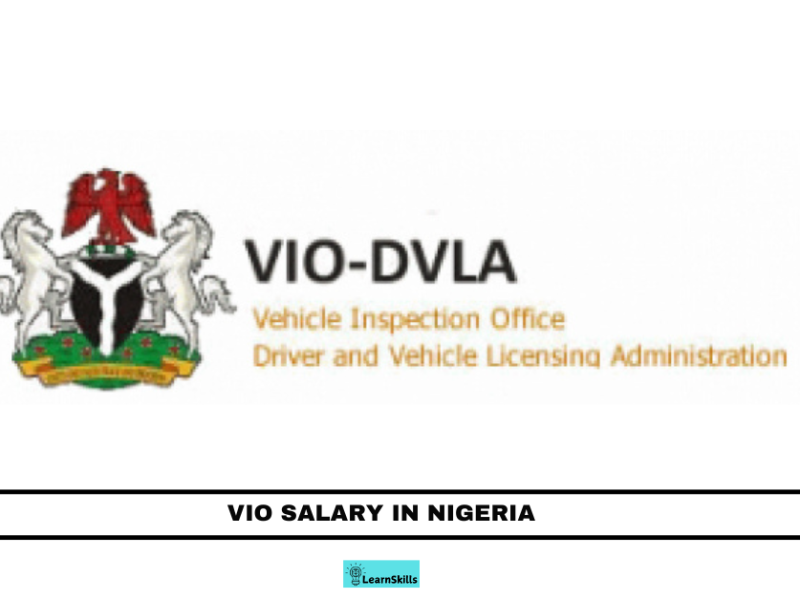If you’re curious about the salary of Vehicle Inspection Officers (VIO) in Nigeria, you’re in the right place.
The estimated monthly salary for entry-level VIO officers ranges from ₦90,000 to ₦120,000. This range can vary based on factors such as location, experience, and the specific government agency.
In this blog post, you’ll learn more about the salary structure for VIO officers, including potential earnings for different levels of experience and the challenges they encounter in their roles.
Overview of VIO
The Vehicle Inspection Officers (VIO) play a crucial role in Nigeria’s transportation system. They ensure that vehicles meet safety and environmental standards.
History and Role of VIO in Nigeria
The Vehicle Inspection Officers were established to enhance road safety and reduce accidents. Their primary functions include inspecting vehicles for compliance with safety standards and issuing appropriate certificates.
VIO officers educate drivers about road safety and environmental impacts, promoting responsible vehicle use.
In recent years, VIO has evolved to adapt to Nigeria’s growing population and increasing number of vehicles. They conduct regular inspections at designated centers throughout the country. Based on findings, they issue citations for non-compliance.
VIO Salary Structure
The salary structure for VIO officers in Nigeria varies by experience and location. For example, entry-level VIO officers can earn between ₦50,000 to ₦70,000 monthly. In larger cities like Lagos, salaries can range from ₦40,000 to ₦120,000, depending on the officer’s rank and duties.
Performance bonuses may be available, increasing overall earnings. For instance, some VIO positions offer additional bonuses that can reach up to ₦180,000 when performance targets are met.
Generally, the average salary for Vehicle Inspection Service Officers in Nigeria is around ₦86,000, reflecting their vital role in maintaining road safety standards.
Determinants of VIO Salaries in Nigeria
Several factors influence the salaries of Vehicle Inspection Officers (VIO) in Nigeria. These factors include your education and qualifications, experience and position within the organization, and the location of your job.
Education and Qualification Requirements
Your education plays a crucial role in determining your salary as a VIO. Typically, candidates need a minimum of a secondary school certificate. However, having a Diploma or a National Certificate of Education (NCE) can significantly enhance your salary prospects.
Employers often prefer applicants with relevant qualifications in automotive technology, engineering, or related fields. Advanced training or certifications in vehicle inspection can lead to better job opportunities and higher pay.
Many recruitment processes prioritize candidates with these educational backgrounds, thus shaping salary scales.
Experience and Position
Experience also greatly impacts your earnings as a VIO. Entry-level officers will earn less than those who have spent years in the field. As you gain experience, your salary can increase accordingly.
Positions within the VIO rank also dictate pay. Higher-ranking officials, like supervisors or managers, typically receive better salaries than entry-level officers.
They’re often responsible for overseeing operations and leading teams, which warrants higher pay due to increased responsibility.
Location and Cost of Living Adjustments
The location where you work significantly influences your salary. Different states in Nigeria have varying salary scales for VIO officers. For instance, salaries in urban areas, like Lagos, may be higher than in rural areas due to the cost of living.
Additionally, some states provide cost-of-living adjustments to ensure that salaries align with local economic conditions.
Understanding these location-based differences is important for estimating your potential earnings and factoring in living costs.
Comparative Analysis of VIO Salaries
When examining VIO salaries in Nigeria, it’s important to understand how they compare to other government agencies and the differences between state and federal pay rates. This analysis looks closely at these aspects to highlight key variations.
VIO vs Other Government Agencies
VIO salaries can differ significantly from those of other government agencies. For instance, the average salary for senior VIO officers in Lagos ranges from ₦60,000 to ₦120,000, while junior officers earn between ₦40,000 and ₦60,000.
In comparison, other governmental roles may offer higher starting salaries. For example, civil servants in certain sectors often earn more due to additional benefits and allowances.
Below is a simple overview:
| Agency Type | Salary Range (₦) |
|---|---|
| VIO (Senior) | 60,000 – 120,000 |
| VIO (Junior) | 40,000 – 60,000 |
| Other Agencies | 70,000 – 150,000+ |
This can affect recruitment and retention in the VIO sector.
State vs Federal VIO Salaries
Salaries also vary between state and federal VIO positions. Generally, federal employees tend to earn more than their state counterparts. Federal officers usually receive additional allowances, making their overall compensation more attractive.
For state VIO officers, salaries may start lower. You might find state officers earning around ₦40,000 to ₦60,000, which can be less than federal positions. This discrepancy impacts job choice for many in the field.
Here’s a breakdown:
| VIO Type | Salary Range (₦) |
|---|---|
| State VIO | 40,000 – 60,000 |
| Federal VIO | 60,000 – 120,000 |
These differences reveal important insights for those considering a career with the VIO.
Benefits and Allowances
As a Vehicle Inspection Officer (VIO) in Nigeria, you enjoy various benefits and allowances that support your financial stability and overall well-being.
These include health insurance, pension plans, holiday entitlements, and bonuses, which contribute to a secure work environment.
Health Insurance and Pension
VIO officers are typically entitled to health insurance coverage, which helps cover medical expenses. This benefit ensures that you can access healthcare services without worrying about high costs.
Pension plans are also a key part of your benefits. After years of service, you can look forward to a steady income during retirement. Contributing to a pension scheme guarantees that you have financial support when you exit the workforce.
Holiday Entitlements and Bonuses
You will find that holiday entitlements are another important benefit. VIO officers often receive paid leave, allowing them to take time off for rest and personal activities without loss of income. These breaks are vital for maintaining a healthy work-life balance.
In addition to holidays, bonuses are sometimes offered based on performance or at year-end. These bonuses can be a substantial addition to your overall salary, helping you achieve your financial goals.
Career Progression and Salary Growth
In the VIO sector, career advancement typically follows a structured path. You can expect salary growth alongside your promotions and increased responsibilities.
Promotion Pathways
As a Vehicle Inspection Officer, you start at different grade levels. For example, officers on GL 10 earn around ₦80,000 to ₦100,000 monthly. As you gain experience, you can move up to GL 12, where salaries range from ₦120,000 to ₦150,000.
The promotion process often depends on years of service, performance reviews, and available positions. Additional qualifications may also boost your chances for advancement. Regular training and workshops can support your development.
As you climb the ranks, your responsibilities increase. Senior officers can earn significantly higher salaries, making it worthwhile to aim for these positions.
Job Satisfaction and Retention Strategies
Job satisfaction plays a key role in retention for VIO officers. Clear communication about roles and expectations is important. Conducting regular feedback sessions can help ensure that officers feel valued.
Effective retention strategies include providing competitive salaries and benefits. Offering career development programs can also motivate employees to stay.
Showing appreciation for hard work, such as recognition programs, can enhance job satisfaction. Implementing these strategies leads to a more stable and committed workforce. This is essential for the efficiency of the inspection process.










